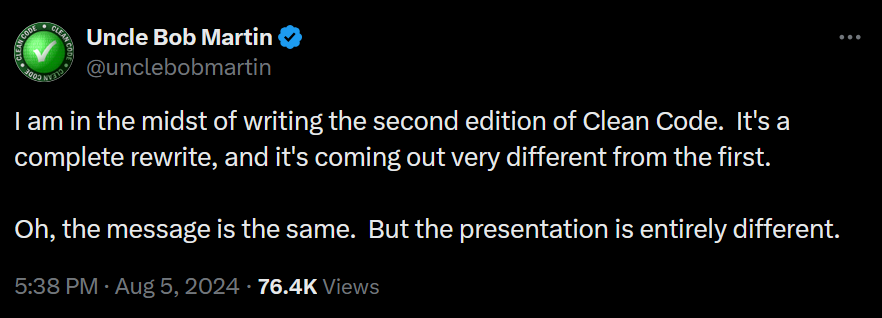this post was submitted on 10 Aug 2024
591 points (97.3% liked)
Programmer Humor
23351 readers
652 users here now
Welcome to Programmer Humor!
This is a place where you can post jokes, memes, humor, etc. related to programming!
For sharing awful code theres also Programming Horror.
Rules
- Keep content in english
- No advertisements
- Posts must be related to programming or programmer topics
founded 2 years ago
MODERATORS
you are viewing a single comment's thread
view the rest of the comments
view the rest of the comments

I categorize this as one of the better points of the book.
I kinda disagree with him on this point. I wouldn’t necessarily limit to one thing, but I think functions should preferably be minimal.
Throughout his examples he’s also using ideas like how functions should only be 3 lines long, preferably have no arguments, and also no return values.
This style of coding leads to programs that are nightmarish to work with. The relevant code you’re looking for might be 10 layers deep of function calls, but you don’t know where. You’re just jumping between functions that does barely nothing until you find the thing you’re looking for, and then you need to figure out how everything is connected together.
I prefer when things are flatter. This generally leads to more maintainable code as it’s immediately obvious what the code is doing and how everything is connected.
I think his book is the equivalent of a cleaning guide where all the steps are just to sweep all the mess under the carpet. It looks cleaner, but it’s not clean.
I do actually agree with him on that point - functions should do one thing. Though I generally disagree on what one thing is. It is a useless vague term and he tends to lean on the smallest possible thing a thing can be. I tend to lean on larger ideas - a function should do one thing, even if that one thing needs 100s of lines to do. Where the line of what one thing is, is a very hard hard idea to define though.
IMO a better metric is that code that changes together should live together. No jumping around lots of functions or files when you need to change something. And split things out when the idea of what they do can be isolated and abstracted away without taking away from the meaning of what the original function was doing. Rather than trying to split everything up in to 1-3 line functions - that is terrible advice.
Yeah, that’s an argument of semantics. I agree with you.
What I believe is that functions should do exactly what they advertise. If they do the things they’re supposed to do, but also do other things they’re not supposed to do, then they’re not minimal.
But I feel like Uncle Bob is leaning more towards that if a task requires 100 different operations, then that should be split into 100 different functions. One operation is one thing. Maybe not exactly, but that’s kind of vibes I get from his examples.
Oh yeah he defiantly does. He even says so in other advice like a function should be about 1-3 lines. Which IMO is just insane advice.
People can take the "do one thing" argument too far. I've seen people have individual micro services for each CRUD action on a resource.
This, but with separate services for read and write operations and another for event handling.
also, the dependency inversion thing makes it so that not even the tooling can help you with that, to put the cherry on the cake
Yeah. I get more of what you're saying now. The 3 line functions on principle are indeed a bit much. Although I've found that sometimes theare necessary to stay consistent with the layers of abstraction (e.g.: a for-loop that writes some data over some bus).